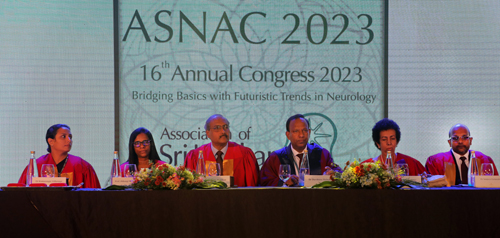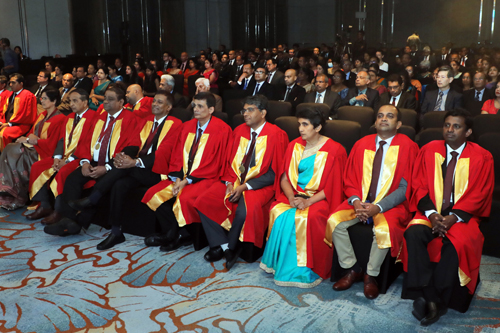News
Focus on the ‘art’ of clinical neurology and bridge basics with futuristic trends

At the head table (from left) ASN Joint Secretary Dr. Kumarangi Withanage; Orator Prof. Jithangi Wanigasinghe; Guest-of-Honour Prof. Jeyaraj Pandian; ASN President Dr. Darshana Sirisena; Chief Guest Prof. Ranjanie Gamage; and ASN Joint Secretary Dr. Sanjaya Fernando . Pix by M.A. Pushpa Kumara
Bridging the basics with futuristic trends is what the 16th President of the Association of Sri Lankan Neurologists (ASN), Dr. Darshana Sirisena is promoting having taken on the mantle in April last year when the country was recording the “most extreme” adverse living conditions.
He assured the distinguished gathering at the inauguration of the ASN’s annual congress on the theme ‘Bridging basics with futuristic trends in neurology’ on Friday in Colombo that the congress would be “unique” and that despite the triple whammies of social-economic-political instability, the ASN has had a productive year.
The Chief Guest was ASN’s Founder President Prof. Ranjanie Gamage, dubbed the “matriarch” in Sri Lanka in the crusade for epilepsy, who spoke on ‘Interphase of mind, brain and religious philosophies’. The Guests-of-Honour were Professor Emeritus of Medicine, Faculty of Medicine, University of Kelaniya, Prof. Janaka De Silva and President-Elect of the World Stroke Organization, Prof. Jeyaraj Pandian.
With pride tinged with humility, Dr. Sirisena underscored that four leading global neurology bodies – the World Federation of Neurology (WFN); the International Parkinson’s and Movement Disorders Society; the International Headache Society; and the Asian Regional Consortium for Headache partnered with the ASN and endorsed the congress.
 Delving deep into the specialty of neurology, he said that rapidly evolving technology including high-end imaging of the nervous system and advances in immunology have made their job easier. Yet, the basic history-taking and examination in neurology cannot be replaced merely by state-of-the-art technology and investigations.
Delving deep into the specialty of neurology, he said that rapidly evolving technology including high-end imaging of the nervous system and advances in immunology have made their job easier. Yet, the basic history-taking and examination in neurology cannot be replaced merely by state-of-the-art technology and investigations.
“It is unfortunate that we frequently witness an MRI (Magnetic Resonance Imaging) of the lumbar spine being prescribed for patients with spastic paraparesis (difficulty walking due to muscle weakness) without any justification. Similarly, a nerve conduction study is unnecessarily ordered for patients with flaccid paraplegia with a thoracic sensory level,” lamented Dr. Sirisena, stressing that this is where they have to bridge the basics with futuristic trends. Basic history taking and examination with the intention of developing a differential diagnosis based on that information cannot be replaced by any other investigation, irrespective of how sophisticated it is.

The distinguished gathering
He went onto explain that clinical neurology is an “art”, where you observe all clinical signs in front of your very eyes, unlike having the advantage of keeping a stethoscope on a patient’s chest and analysing what is heard. The focus should be on interpreting and identifying the patterns and answering three simple questions – What is the lesion? It could either be upper or lower motor neuron (UMN or LMN) or a combination. What guides you to decide wherethe lesion is either in the central nervous system (CNS) or peripheral nervous system (PNS) and finally the question: Why?We aim at aetiology and confirmation by investigations which could be simple or very sophisticated.
Moving on to applying these questions to Sri Lanka’s health system which is “unique”, he said that this reputation is at stake currently. What has been the investment to achieve this unique status? According to World Bank statistics, Sri Lanka, when compared to other countries which have similar indices, has invested minimum in health. Some are of the view that though indicated even this amount is not invested in practice. Then how could we sustain all these and remain almost on par with more privileged economies? This is due to the three factors of: free health, equity and the public health system.
“Any citizen irrespective of gender or social status can access a government health institute. Any one of the 1,103 hospitals spread across the country can be reached within an hour. Thereafter, the whole healthcare process is done free of charge by the government. Though we face a huge crisis at present in providing healthcare due to the prevailing economic crisis, no matter what challenges we face, we must uphold the 3 concepts mentioned previously. At times, I feel that the free health system is taken for granted. I hope that professional colleges will play a more significant role in this arena,” added Dr. Sirisena.
| Oration on ‘Seizures in small brains’ | |
 Prof. Jithangi Wanigasinghe The prestigious Dr. J.B. Peiris Oration on the topic ‘Seizures in small brains’ was delivered by Prof. Jithangi Wanigasinghe, Sri Lanka’s very first Paediatric Neurologist. Prof. Wanigasinghe is Professor in Paediatric Neurology, Department of Paediatrics, Faculty of Medicine, University of Colombo.
 Dr. Darshana Sirisena hands over the Orator’s certificate to Prof. Jithangi Wanigasinghe |
| ‘Let’s get junior specialists to centres of excellence for a few days every month from their regular postings’ | |
| In the light of brain drain being a hotly discussed topic, Dr. Darshana Sirisena looked backward and forward coming up with an innovative solution to keep young specialists in the country.He said that compared to 12 years ago when he began his career as a neurologist at the Badulla Provincial General Hospital, there have been “huge” strides in the provision of neurological services in the country.Whereas in 2010, there were 21 Adult Neurologists; 2 Paediatric Neurologists and 1 Neurophysiologist; in 2022, there were 48, 7 and 4 respectively.Pointing out that if this pace is continued Sri Lanka could easily achieve effective island-wide coverage, Dr. Sirisena said there is a need to look at providing quality neurology care beyond basic services such as establishing clinics. “This is where the present environment and the pace of brain drain matter most.What options do we have? We need to balance our professional life with our personal life, not compromising either. Does the current system provide opportunity for this? The answer is yes and no,” he said, proposing a “mechanism” where the knowledge of young people returning from foreign training could be used for the betterment of service on their return. According to Dr. Sirisena this mechanism should enable them to serve in a centre recognised for excellence at least for a few days each month to exercise their skills, rather than be posted to remote centres with minimal facilities. This needs a huge attitude change within the fraternity. “We must acknowledge that these junior colleagues are our friends and not enemies. This is the only way forward in developing finer specialties in neurology such as epilepsy, stroke, movement disorders, headache, sleep neurology and more,” he said, adding that he secured this experience not during his 12 years as a neurologist serving the four provinces of Uva, North Central, North Western and Western, but by serving as a member of the Health Ministry’s Transfer Board trying to balance members’ expectations and ministry demands.
|
The best way to say that you found the home of your dreams is by finding it on Hitad.lk. We have listings for apartments for sale or rent in Sri Lanka, no matter what locale you're looking for! Whether you live in Colombo, Galle, Kandy, Matara, Jaffna and more - we've got them all!

